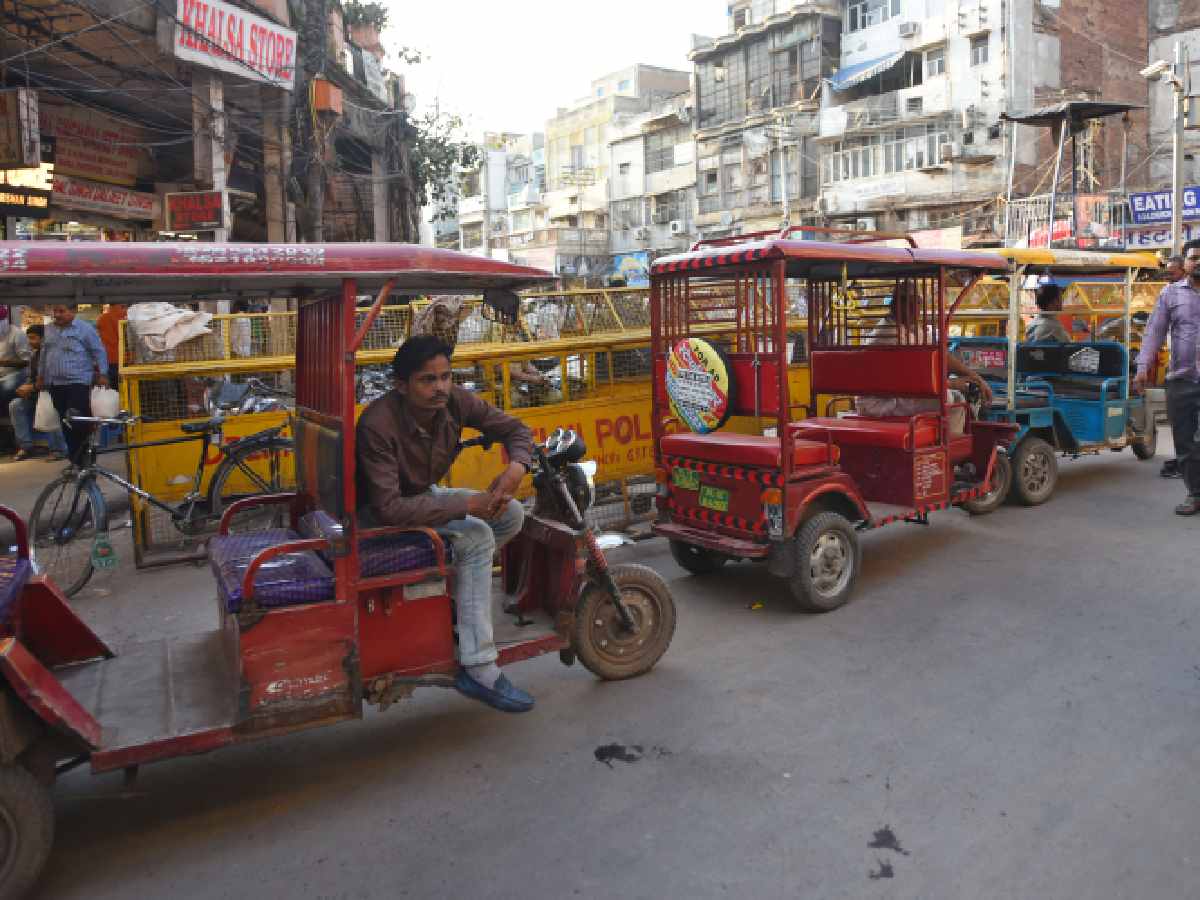
Delhi: Despite government schemes aimed at promoting electric vehicles (EVs) to curb vehicular emissions—a major cause of air pollution—e-rickshaw drivers, expected to benefit from these initiatives, face significant hardships. Inadequate charging infrastructure and limited maintenance facilities make it challenging for them to sustain their livelihoods.
Delhi, home to nearly 1,20,000 registered e-rickshaws, struggles with insufficient charging stations. According to Delhi government data, the city has only 543 stations, meaning each station caters to an average of 221 e-rickshaws. This gap forces drivers to depend on private charging facilities, significantly increasing their operational costs. For many, the promised benefits of e-rickshaws are overshadowed by the daily struggles they encounter.
The high cost of ownership
Santosh Tiwari, an e-rickshaw driver and the sole breadwinner for his family of four, invested Rs. 3.40 lakh to purchase his vehicle, availing a government subsidy of Rs. 30,000. Reflecting on his decision, Tiwari expressed regret, stating, “It is my biggest mistake to buy the e-rickshaw instead of a CNG rickshaw. Though it costs Rs. 2 lakh more, it would have saved me from constant worries and losses.”
Over time, the performance of his e-rickshaw has deteriorated. Initially, it provided a range of 110 km per charge, but within two years, this has reduced to 80 km. Charging the vehicle takes nearly 3 hours and 45 minutes, during which Tiwari loses potential earnings of Rs 400-500. “Fully charging the vehicle costs Rs 60 per hour, amounting to Rs 240 for a full charge. The expenses and wasted time make it as costly as operating a CNG rickshaw,” he explained.
Also read: Air pollution: Closed schools throttle livelihood of Delhi’s hawkers
Declining earnings
Naresh Kumar, another e-rickshaw driver, echoed similar frustrations. His vehicle provides a range of 90 km per charge, necessitating frequent visits to charging stations. “As daily wage workers, we cannot afford the time or money lost due to frequent charging. It’s a huge financial burden,” Kumar said.
The burden of private charging stations
To avoid long queues at government-operated charging stations, many drivers opt for private facilities. However, this alternative comes at a higher cost, further straining their finances.
Kumar highlighted the challenges of relying on private charging setups. “A person in my neighbourhood runs a charging station in his basement. While it saves time, it costs Rs. 80 per hour—Rs. 20 more than government-run stations.” Despite the added expense, drivers like Kumar are compelled to use these facilities to avoid wasting hours in queues.
Rakesh Kushwaha, who drives an e-rickshaw on the Krishna Nagar route, also relies on private charging points. “Public charging stations are overcrowded, and my vehicle requires recharging every four hours. Private facilities charge Rs. 80-90 per hour, but we have no other choice if we want to save time.”
Many drivers report that private charging facilities, while a quicker solution, come with fluctuating rates depending on the operator. The absence of standard pricing for these services adds to the unpredictability of daily expenses, further burdening drivers. Some drivers expressed frustration over the lack of regulation in the private charging sector, emphasising the need for government intervention to establish fair pricing practices.
Maintenance woes and performance decline
The challenges do not end with charging. Many e-rickshaws experience significant performance issues within a year of purchase, adding to drivers’ financial burdens. Reduced mileage and frequent breakdowns require repairs, but the lack of proper maintenance facilities compounds the problem.
Kushwaha described his struggles with vehicle deterioration. “After just one year, my e-rickshaw’s performance dropped significantly. It barely runs 80 km per charge now, and finding reliable service centres is very difficult.” Informal repair shops often lack the expertise to handle electric vehicles, leading to higher costs and prolonged downtime.
Drivers also note that replacement parts for e-rickshaws are often expensive and not easily available. Many must rely on local mechanics who lack the specialised knowledge required for electric vehicle repairs, resulting in suboptimal fixes and recurring issues.
Also read: Why houseplants aren’t the solution to clean air
An uncertain future
Many drivers, like Tiwari and Kumar, question the feasibility of continuing with e-rickshaws given the persistent difficulties.
Drivers like Kushwaha, who relocated to Delhi from Bihar, initially saw e-rickshaws as an opportunity for steady earnings. However, the daily grind of managing charging schedules, finding affordable facilities, and maintaining the vehicle has made the reality far less promising.
Despite government efforts, the situation for e-rickshaw drivers remains precarious. While some districts in Delhi have expanded charging infrastructure, the overall support system falls short of meeting the needs of drivers, leaving their future uncertain.
AQI rises to 208, slipping into ‘poor’ category, according to the Central Pollution Control Board
Dilli 6 – Ishq-e-Dilli at Edesia presents a carefully sequenced journey through familiar flavours from…
Two youth arrested for killing a 55-year-old woman during a robbery in Jyoti Nagar; stolen…
Scheme aims to provide affordable meals to over 1 lakh people daily, with each canteen…
Featuring works by Krishen Khanna and Prabhakar Kolte, the exhibition explores Indian modernism through figurative…
Police are probing the stabbing death of a 36-year-old man found near Sanjay Lake in…